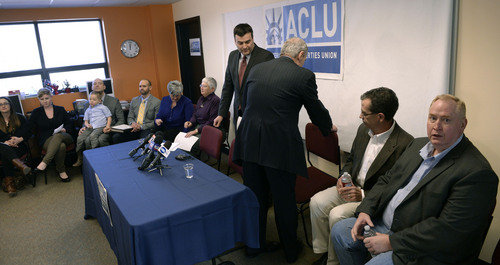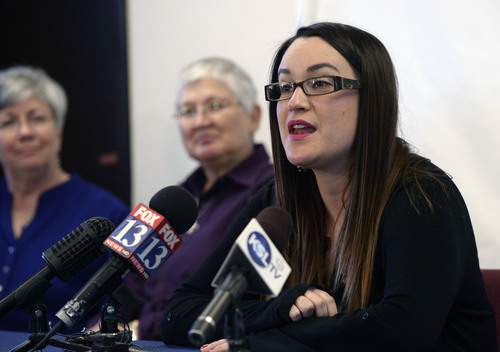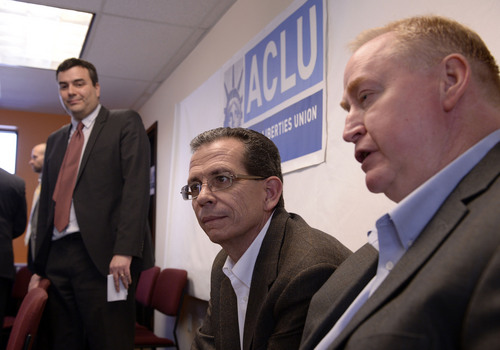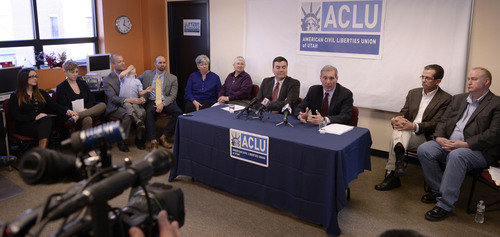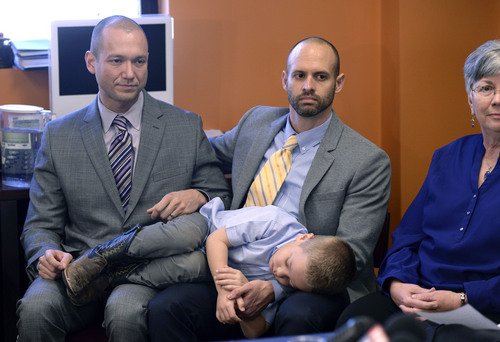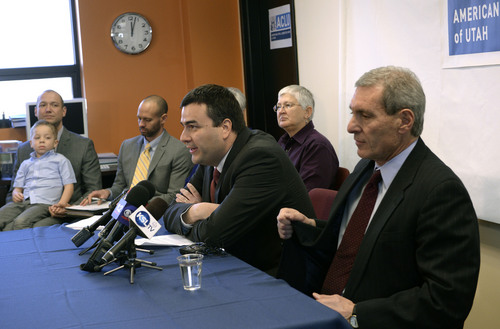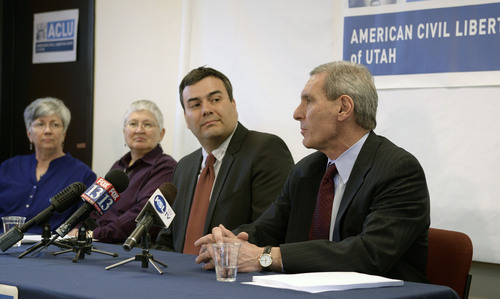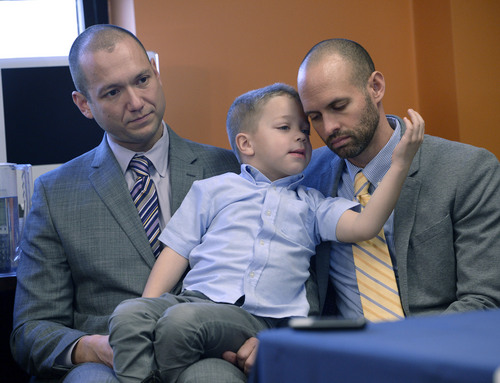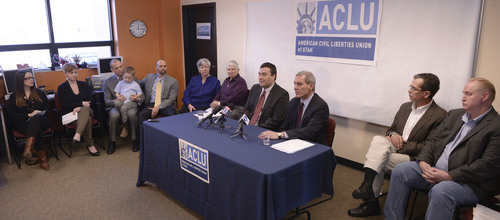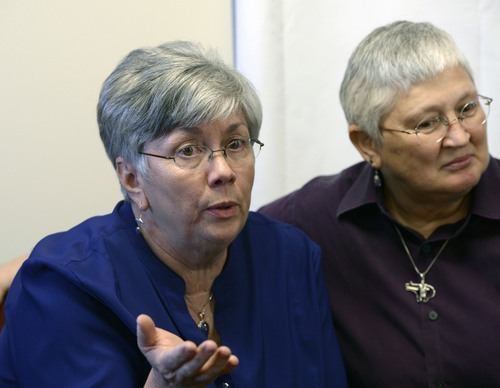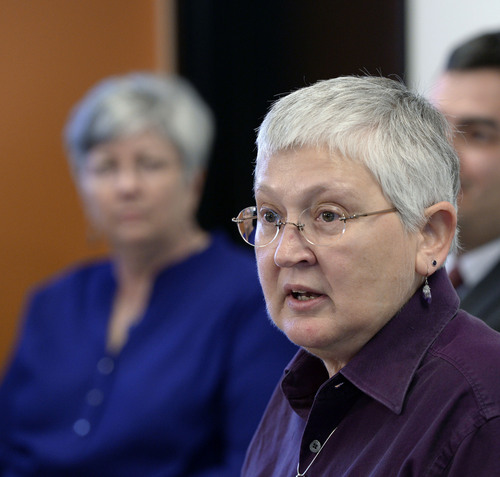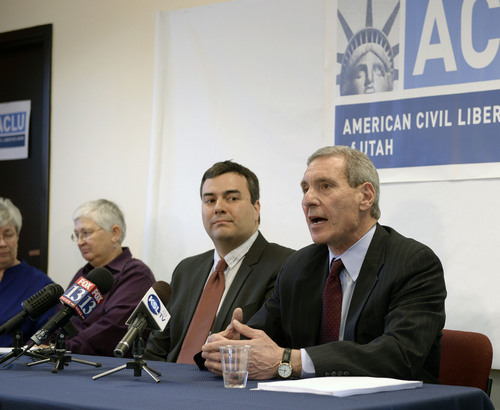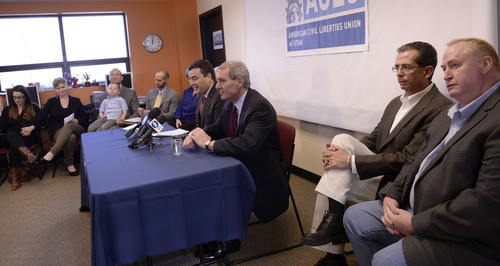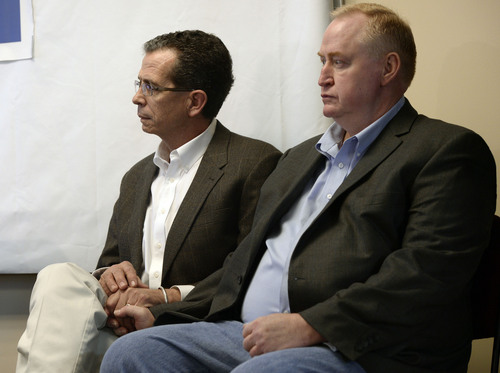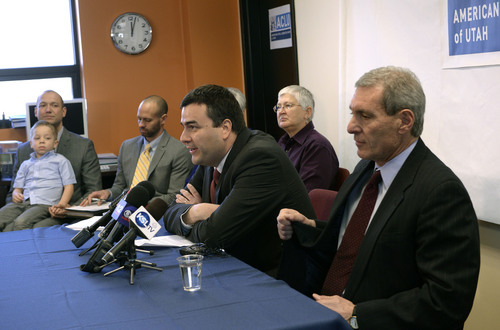This is an archived article that was published on sltrib.com in 2014, and information in the article may be outdated. It is provided only for personal research purposes and may not be reprinted.
The ACLU of Utah and a private law firm filed a lawsuit in state court Tuesday on behalf of four same-sex couples who say Utah's decision to put recognition of their marriages on hold has created a "legal limbo" that bars them from accessing critical protections for themselves and their families.
"We brought this lawsuit because these couples, and what we estimate are over 1,000 other same-sex couples, were legally married under Utah law," John Mejia, legal director of the ACLU of Utah, said during a news conference. "We ask the court to make clear and order that these unions must be treated the same as any other Utah marriage."
Even Utah Attorney General Sean Reyes acknowledged the validity of the marriages at the time they were performed, Mejia added.
But the state's Jan. 8 decision to freeze recognition while it appeals a federal judge's decision overturning Utah's ban on same-sex marriage has "reduced these unions to second-class marriages," said Erik Strindberg, of the Salt Lake City law firm Strindberg & Scholnick. Strindberg said the lawsuit was filed in Utah's 3rd District Court in West Jordan rather than federal court because three of the four claims involve state claims.
The lawsuit alleges the state's move to retroactively strip the couples of their marital rights is illegal, arbitrary and capricious. It deprives them of their liberty and property rights, leaving them in a "constant state of insecurity and uncertainty, which is emotionally devastating." The suit asks that the marriages be declared valid — even if Amendment 3's ban is eventually deemed constitutional.
The plaintiffs are JoNell Evans and Stacia Ireland; Marina Gomberg and Elenor Heyborne; Matthew Barraza and Tony Milner; Donald Johnson and Carl Fritz Shultz.
Defendants in the lawsuit are the state, Reyes and Utah Gov. Gary Herbert.
The attorney general's office reiterated Tuesday that with U.S. District Court Judge Robert J. Shelby's decision now stayed, it is required to uphold the law barring same-sex marriage. Herbert said much the same in a statement released by his office.
"Governor Herbert has said throughout this process that his responsibility is to follow the law," said spokesman Marty Carpenter. "That is exactly what the administration is doing and we respect the rights of those who disagree to take their grievances before a judge."
While not a class-action lawsuit, the complaint seeks an injunction of the state's decision that would apply to all marriages that occurred during the 17-day period between the Dec. 20 ruling overturning Utah's ban and the Jan. 6 decision by the U.S. Supreme Court to grant a stay of the order.
Clerks in Utah's 29 counties reported issuing more than 1,300 marriage licenses to same-sex couples during that period. The lawsuit states that more than 1,000 of those couples solemnized their marriages before the stay took effect.
On Jan. 8, Utah announced the marriages would be frozen during its appeal to the 10th Circuit Court of Appeals, which will likely be followed by an appeal to the U.S. Supreme Court.
Although Utah placed the marriages on hold, it later said the couples could file joint state tax returns. The attorney general's office also acknowledged that the licenses may be considered valid in other states that recognize same-sex marriage. And the U.S. Department of Justice announced valid marriages would be recognized for federal benefit purposes.
That has created much uncertainty for same-sex couples, Mejia said, from what happens to ongoing adoption proceedings to whether they can add their spouses to their insurance plans and whether they will be included in making medical decisions for their spouses.
"Regardless of what ultimately happens in the federal challenge to Utah's marriage ban," Mejia said, "the marriages that have already occurred are valid and must be recognized now."
For Tony Milner, 34, and Matthew Barraza, 38, it's about ensuring that their 4-year-old son, Jesse, has two legal fathers. The two men were born, reared and educated in Utah and, though they are no longer members of The Church of Jesus Christ of Latter-day Saints, have the support of their families.
"We always wanted to be dads," Milner said. "Four years ago we welcomed Jesse into our lives at birth."
They were on hand for the birth, were able to cut their son's umbilical cord and have an ongoing, open relationship with Jesse's biological parents. They married in Washington, D.C., in 2010.
Since only one of them was able to legally adopt Jesse under Utah law, they chose Barraza, who is an attorney.
Their worries about how to make Milner's relationship with their son just as secure seemed to vanish with Shelby's ruling. They rushed to the Salt Lake County clerk's office Dec. 20 to make their 11-year relationship official after getting word of the decision. Six days later, they filed an adoption proceeding to add Milner as their son's second legal parent, providing him with the "security that all children deserve so that, heaven forbid, should something happen to one of us, Jesse would have the security of having his other parent to take care of him and to provide for him."
The first hearing in the adoption proceeding was set for Jan. 10, but they asked to have it postponed after a court clerk contacted them and said they would have to notify the attorney general's office of the pending adoption.
"Now, because of the state's refusal to recognize our marriage, this peace of mind is again out of reach," said Milner, who is the executive director of a homeless shelter.
Marina Gomberg and Elenor Heyborne, who have been together for more than nine years and work in communications, also married in the wake of Shelby's ruling. They had a commitment ceremony in 2009 and for the past several years have contemplated starting a family. But they also worried about the inability to both be recognized as their child's legal parents.
That obstacle seemed to vanish with the ruling, Gomberg said.
"Even all the love and support of our families couldn't change our tax status or guarantee hospital visitation or protect our ability to legally co-parent," Gomberg said. "Having the recognition and protection of marriage immediately lifted that weight from our shoulders that we had carried for so long we had become numb to it. We want to be married to strengthen and protect our bond and our commitment to one another, especially to create a safe environment to raise a child, or two. And we don't want to have to leave Utah to do that."
JoNell Evans, 61, and Stacia Ireland, 60, said they decided to be plaintiffs in the lawsuit because of their "before" and "after" experiences in a medical crisis. After seeing friends kept from one another, the two, who have been together for 13 years, drew up wills and powers of attorney in hopes of protecting their rights.
Those documents were put to a test in 2010, when Ireland suffered a heart attack.
"Jonelle had to scramble to locate our legal documents before we left for the hospital," said Ireland, a semi-retired junior-high school math teacher who now works with students who have disabilities at a community college.
Evans was allowed to stay with Ireland, but hospital staffers were hesitant to include her as they would a spouse in making decisions, Ireland said.
Like the other couples, they rushed to the Salt Lake County clerk's office after hearing of Shelby's decision and were married by Salt Lake City Mayor Ralph Becker.
On New Year's Day, Ireland again experienced severe chest pains that brought them to an emergency department. This time, Evans was identified as Ireland's wife and was treated with "all the courtesies and rights given to the married spouse of a patient," the lawsuit states.
"The difference was dramatic for us," Evans said.
They returned to the hospital for a follow-up procedure Jan. 9, a day after the state's announcement, unsure what would happen and brought along paper work to prove their married relationship.
"We're back to square one, with no idea what's going to happen to us if one of us is hospitalized," Ireland said. "After 13 years together, we just want the security and peace of mind to know we can be there for each other in the hard times."
But, she added, "we're back to that world of uncertainty again."
Donald K. Johnson, 61, and Carl Fritz Shultz, 58, have been a couple for more than 21 years and finally married Dec. 23. Johnson, a veteran high school teacher, described them as typical good neighbors — the kind of people who "lend a hand when you need one" with dog sitting, lawn mowing or sidewalk shoveling.
"We are not an affront to the citizens and moral values of our community," Johnson said. "We don't have the luxury of time to wait for the younger gay community to win our rights for us. It's time that Fritz and myself stand up and become proud gay men and advocates for our own rights as citizens of the state of Utah."
He said his biggest worry after their marriage was telling his co-workers and students, even though the ceremony was videotaped by ABC News and shown on several news reports including CNN. The reaction was overwhelmingly supportive, and the class he teaches at an alternative high school even burst into applause at the news.
The two had explored but ultimately couldn't afford the $4,000 to $5,000 they estimated it would cost to draw up legal documents protecting their rights.
After marrying, Johnson immediately called and got a family auto insurance plan, saving them $800 immediately. They also began checking into getting on the same health insurance plan, which they figure will save them $8,000 a year. But they aren't sure whether they will be able to proceed.
"That's one of those big ifs," Shultz said.
State gets filing extension
The 10th U.S. Circuit Court of Appeals has given Utah more time to file its appeal challenging a lower court ruling that the state's ban on same-sex marriage is unconstitutional.
The court agreed to extend the filing deadline by seven days, which means the state's brief is now due Feb. 3. It had been due Jan. 27. The court also extended other deadlines, giving the plaintiffs' attorneys until Feb. 25 to file a response and the state until March 4 to submit its final arguments.
Utah had asked the court for a 10-day extension, which it said was warranted because of the importance of the case and because hiring outside counsel took longer than expected. The plaintiffs' attorneys objected to more time, saying every additional day prolongs the injustice to same-sex couples caused by the marriage ban.


